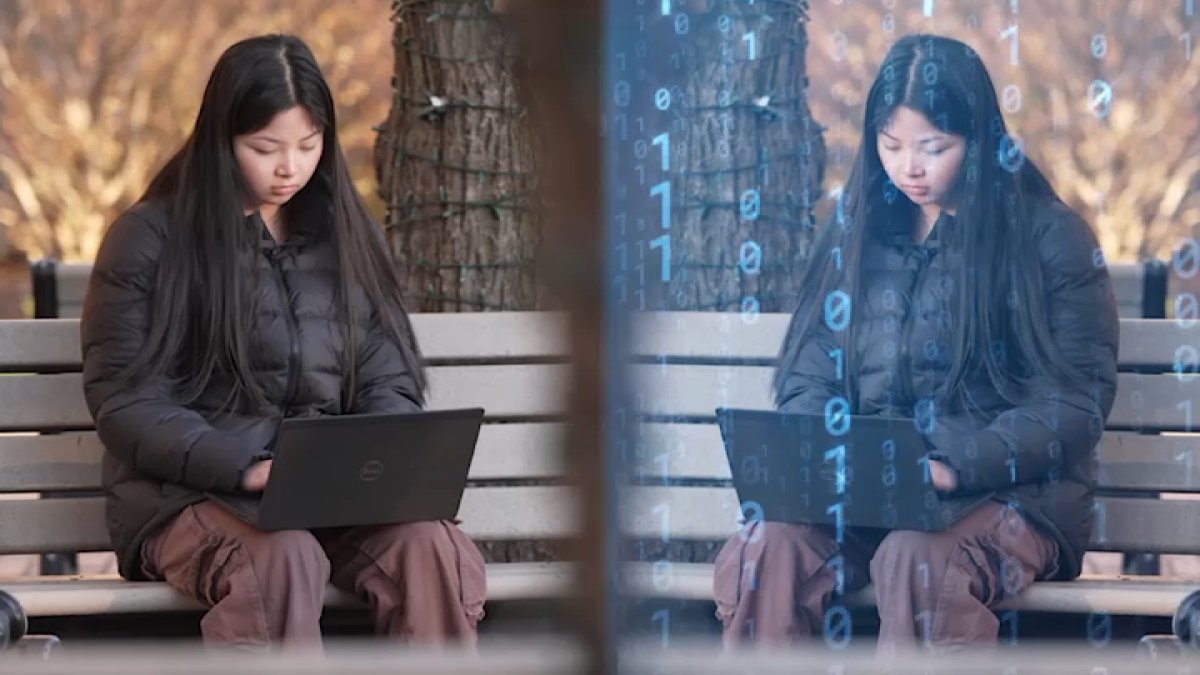Abigail Lee, a data science and comparative literature major at Boston University, remembers sitting alone in her room, the ring light staring at her, as the countdown on her screen ticked away.
She had already applied to over 100 tech internships for next summer, and this preliminary interview was no different, much to her dismay.
NBC10 Boston
NBC10 Boston Abigail Lee on campus
That’s because Lee was sitting down for a virtual interview platform that is becoming commonplace for many of today’s candidates. Instead of talking to another person, she was conversing with her own reflection on the computer screen.
When the taping began, Lee wondered how to “beat the system” and differentiate himself from other candidates. She worried about where her hands were placed, if she blinked too much, or how many attempts she would have to make before submitting an answer.
“It’s harder to feel comfortable during the hiring process,” Lee said. “It’s very impersonal. You just look at each other while you answer.”
For those who have been in the business for many years, conducting interviews without human interaction can seem completely foreign. Lee’s experience, however, is becoming second nature to students and entry-level workers just entering the job market.
The rapid rise of artificial intelligence has not yet reached its peak, but early signs show major changes for American workers. And the implications go far beyond the hiring process, say experts who study the implications of AI.
According to the McKinsey Global InstituteActivities that account for up to 30% of hours currently worked in the U.S. economy could be automated by 2030.
NBC10 collaborated with Boston University students who took an in-depth reporting course taught by investigative journalist Ryan Kath. We’ve taken an in-depth look at how AI is changing not only the job market, but also the skills workers need to thrive in it.
In September, OpenAI released a new evaluation system that measured how well AI models can perform real-world work. According to the report, top AI models like Claude Opus 4.1 already perform at or above the quality of a human expert in about 45% of real-world tasks sampled across 44 professions, from lawyers and financial analysts to nurses and real estate agents.
The changing job market means recent graduates and entry-level candidates may feel the effects first. The challenge is understanding how these changes manifest in real life, said the experts we interviewed.
Mohammad Soltanieh-ha, clinical assistant professor at Boston University’s Questrom School of Business, is participating in a collaborative study examining the impacts of AI on labor demand. He and his colleagues found that the hiring rate gradually becomes more lopsided in favor of experienced workers.
NBC10 Boston
NBC10 Boston Mohammad Soltanieh-ha
“The rate of increase is much faster at higher levels,” Soltanieh-ha said. “If you think about the downstream effect of this, which is that there’s not new talent coming in and being trained by more experienced people, then where will we be in a few years?
Research by Professor Mei Xue of Boston College, which studies how AI adoption is reshaping work structures, shows that as companies integrate AI into their operations, the value of graduate skills declines.
NBC10 Boston
NBC10 Boston Mei Xue
According to Xue, AI actually reduces the hiring of college graduates, but increases the hiring of people without college education due to the “technological deskilling effect of AI.” These associations are particularly important in the service sector, where core skills cannot be automated.
Recently, we went to Commonwealth Avenue to hear how BU students feel about AI. Josh Kaplow, an international relations student, expressed his concerns for the future.
“I think it’s going to start taking a lot of jobs, which is scary just being in college,” Kaplow said. “But I think if we can learn how to use it and keep it under control, it will be a very useful tool.”
Lukas Freund, assistant professor of economics at Boston College, studies how AI adoption is transforming the workplace. It does not focus specifically on how AI replaces entire tasks, but rather on changing the tasks within them, such as processing and summarizing documents or performing calculations.
NBC10 Boston
NBC10 Boston Lucas Freund
“Certainly AI is going to change the tasks that are performed in a job,” Freund said.
What the experts we spoke with emphasized most is this: While AI can serve as a tool to replace skills like data analysis and document processing, it cannot replace the interpersonal skills still required to succeed in the job market and advance a career.
Soltanieh-ha and Freund emphasized the importance of core competencies in recognizing these intangible skills. They say this includes the ability to understand human emotions and connect, think critically, and be flexible in learning environments. These characteristics will all be needed in a job market that embraces AI, Soltanieh-ha said.
Professor Xue believes that educational institutions must adapt in order to keep up with the AI era and stay ahead of the curve.
Meanwhile, students like Lee feel compelled to stand out amid the endless sea of virtual AI interviews. Beyond her technical training and experience, she knows she will have to do a little more to get a job.
“One thing I’m going to think about in the future is how can I make myself most helpful from a people perspective? » Lee said. “Not just for the sake of being a good person, but also for the sake of my future. It’s pretty futile to fight against the implementation of AI. It’s a part of life now.”
Generative artificial intelligence raises big questions in higher education, from how students apply it in their daily work to how universities should respond with their academic programs and institutional studies.
The story was written by Hernandez Ramirez, Portman and Leyba Macedo and edited by Kath.
NBC10 Boston
NBC10 Boston Ashley Hernandez Ramirez, Hannah Portman, Adriana Leyba Macedo










